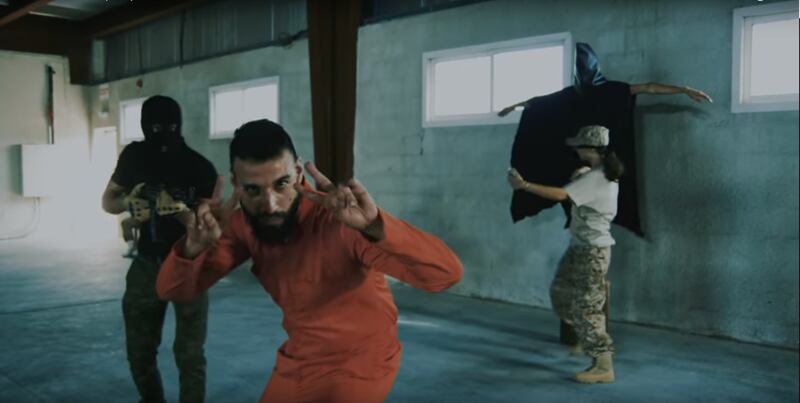When Childish Gambino released his viral video ‘This Is America’, depicting police brutality alongside themes of racism and inequality, Dubai-based rapper I-NZ took it upon himself to do the same for the country of his parents: Iraq.
Released to coincide with American Independence Day on July 4, his take on one of the music videos of 2018 has already amassed more than 600,000 views on YouTube and looks set to break the million mark.
Beginning with an old Iraqi man playing the oud, the video goes on to show dead Iraqis draped in American flags, hooded parents surrounded by barbed wire and masked gunmen fist-bumping US soldiers.
I-NZ, a 33-year-old Iraqi-Kiwi whose real name is Majid, sought to use Gambino’s song to send a message to the world about what has happened to his country of heritage since the US invasion.
“Ultimately, I want people to remember what Iraq has gone through from 2003 until today,” he tells The National in his first English-language interview. “As soon as I heard [the song], I knew there was an opportunity to use Childish Gambino’s platform to get our message across.”
Iraq has emerged from a three-year occupation by ISIS militants in part helped by the US withdrawal of its troops in 2011. But Majid wants the memories of the years-long American occupation before that to remain.
“Just because the media aren’t holding a magnifying glass to Iraq anymore, doesn’t mean that people aren’t still dying,” he says.
The old man’s oud notes are brutally cut short by a gunshot to the chest. A US soldier is seen forcing the Iraqi youth, clad in an orange jumpsuit, to shoot his compatriot.
“It represents the transition from the old and beautiful, to the new and ugly, depicted by the soldiers who are forcefully pushing the country into a war that it wanted no part of,” he says.
The visuals of the music video are striking and bring back the most haunting images of the Iraq War, the conflict in which hundreds of thousands of Iraqis were killed. So too are the lyrics.
“Take your clothes off (rape)
Takin photos (ghraib)”
They allude to some of the incidents of the war that brought the harshest of condemnation on the United States. In one episode, a group of five soldiers invaded the home of an Iraqi family of four, raping a 14-year-old girl and killing her parents and sister.
Ghraib refers to the Iraqi prison where US soldiers tortured, raped and abused Iraqi detainees. In one case, smearing faeces on a prisoner, in another forcing them to perform indecent acts. The most famous image from that centre is the “Hooded Man”, a cloaked prisoner forced to stand on a box without his sight or his clothes but hooked up to electric wires.
______________
Read more:
Iraq PM looks to calm Basra unrest as demos spread
Inquiry launched after police shoot protesters in Basra
Kuwait ready to 'assist' Iraq amid protests
______________
“What made the reality of war hit me on an extreme emotional level were the iconic images that were published during and after the war. We attempted to bring a few of these images back to life in the music video,” Majid says.
“The worst would have to be the disturbing images from Abu Ghraib, the father holding his son while his head was covered and the countless number kids running around covered in blood.”
Former US President George W. Bush is also shown holding up a banner that reads “Mission Accomplished”, mocking his famous speech delivered just six weeks after the invasion in 2003. The war would continue for years in spite of mass protests against the invasion.
The American leader at the time of the invasion and the US soldiers who did his bidding are not Majid’s sole target. He criticises the press coverage that led to the war and how it was eventually covered.
“They don' get it,
They’re immune,
This is telly,
That's the news,
Media blackout,
Then it’s lights out”
For Majid, filming the video was a complex task, creating three scenes and calling upon dozens of extras to shoot them in a single day in a boiling warehouse in an undisclosed location. The entire process, from conception of idea to delivery of the production took just over two weeks.
He says younger viewers have already been thanking him for “enlightening them” about Iraq as they could not remember the start of the war. For Majid, that awareness may be the video’s greatest achievement of all.
“If this music video can have a positive impact on just one person, then I will feel vindicated in having gone ahead with it,” he says. Gambino, real name Donald Glover, is yet to comment on the video.
The final scene shows an Iraqi man left to sweep up a large pool of blood. The act is a symbol of the feeling for many Iraqis today: that they have been left to clean up the chaos of America’s invasion.
“It just goes to show you the painful and disturbing reality of war,” Majid says.





